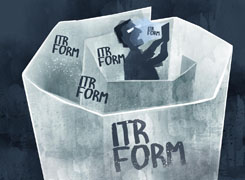Dear Sir...........out my three SIPs two are more than one year old and hence the gain earned so far on NAV units (of more than one year old) will qualify for LTCG. Whether it will be prudent to redeem these units ( of more than one year old) to avail benefit of Annual limit of Rs.1.25 Lakh of LTCG. Since these investments are for my long term goal, I will reinvest the redemption value received immediately in the same category of MFs and purpose of this exercise is just to avail benefit of LTCG tax exemption to the ANNUAL LIMIT of Rs.1.25 Lakh. Please suggest your valuable advice and will there be any negative impact on my overall investment.
Ans: it is admirable that you are already thinking about how to optimise your tax liabilities. When we talk about the Rs 1.25 lakh LTCG (Long-Term Capital Gains) exemption limit, many investors overlook this excellent opportunity to reduce their tax burden. Your proactive approach is commendable.
Now, regarding your query about redeeming units that are more than one year old, and reinvesting in the same mutual funds category to avail the LTCG exemption, it’s important to assess this strategy from a 360-degree perspective. Here’s a detailed and structured analysis to help you make an informed decision.
Understanding Long-Term Capital Gains (LTCG) and the Rs 1.25 Lakh Exemption
Long-term capital gains (LTCG) from equity mutual funds held for over one year are taxed at 12.5% if they exceed Rs 1.25 lakh in a financial year.
The first Rs 1.25 lakh of gains from your equity funds is exempt from tax each year. Hence, if your gains have crossed this limit, it's a great strategy to utilise this exemption.
By redeeming units that are more than one year old, you can realise the gains tax-free within the Rs 1.25 lakh limit and reinvest in the same funds, maintaining your investment horizon.
This approach works because any additional LTCG beyond Rs 1.25 lakh is taxed at 12.5%. Therefore, realising gains up to the exempt limit each year will help minimise your overall tax outgo in the long term.
Redeeming and Reinvesting Strategy
You mentioned that your investments are meant for long-term goals, so you intend to reinvest immediately after redemption.
Reinvesting ensures that you remain invested in the market and do not miss out on future potential growth. However, this strategy needs careful timing, as there could be minor costs in the form of transaction fees or exit loads if applicable, depending on the mutual fund you hold.
One key thing to remember is that reinvestment resets the holding period for the new units. So, when you redeem again in the future, the one-year timeline for LTCG exemption will start afresh from the date of reinvestment.
Despite this, redeeming and reinvesting to utilise the Rs 1.25 lakh exemption each year is an efficient way to reduce tax liability while keeping your long-term goals on track.
Impact on Your Long-Term Investments
The good news is that redeeming and reinvesting units of more than one year old should not affect your overall investment growth in the long run, as long as you stay committed to reinvesting the redemption proceeds into the same category of mutual funds.
Equity markets have their ups and downs. By staying invested and reinvesting promptly, you will continue to benefit from the potential compounding effect over time.
This strategy will not change your exposure to equities or alter the risk profile of your portfolio if you reinvest in the same mutual fund category.
The only minor impact may be the potential short-term volatility on the day you redeem and reinvest, which is usually negligible for long-term investors.
One point to keep in mind is market fluctuations. If the market is up at the time of redemption and down when you reinvest, you may lose some gains. However, for a long-term investor like you, these short-term blips should not be a major concern.
Evaluating Reinvestment Costs
Before proceeding with this strategy, ensure there are no exit loads applicable on the funds you plan to redeem. Exit loads, if any, are usually levied on units held for less than one year, so since your units are older than a year, this may not apply.
Transaction fees may also be incurred while redeeming and reinvesting. Some mutual funds or platforms charge small fees for each transaction. Although minor, over time these fees could add up, so it's essential to factor this in.
There might be a marginal difference between the NAV at the time of redemption and reinvestment due to daily market fluctuations. However, this impact is usually very small, and over the long term, the difference balances out.
As long as these costs are minimal and do not exceed the potential tax savings from the Rs 1.25 lakh LTCG exemption, the strategy remains sound.
Alternative Considerations
If the funds you hold are actively managed funds, redeeming and reinvesting makes sense, especially because actively managed funds are designed to outperform the market over time.
In comparison, index funds or ETFs, which only aim to match market returns, might not offer the same potential upside. This means that if you're redeeming and reinvesting in actively managed funds, your long-term potential for growth remains high.
Also, direct mutual funds may seem like a better option due to lower expense ratios, but when you're using an MFD (Mutual Fund Distributor) with CFP (Certified Financial Planner) credentials, you benefit from professional guidance. This helps in managing not only returns but also asset allocation, portfolio rebalancing, and overall strategy, which justifies the slightly higher expense ratios.
Regular funds, though they come with a marginally higher cost than direct plans, are worth it because of the long-term hand-holding and personalised financial planning they offer. This is especially useful for managing complex investment portfolios over long horizons like yours.
Long-Term Goals and This Strategy
Given that your investments are for long-term goals, the overall impact of this redeeming-reinvesting exercise on your financial goals should be minimal. This is because your fundamental asset allocation to equities remains unchanged.
By periodically booking tax-free gains, you are not only optimising your tax outgo but also managing your portfolio efficiently. Over time, this will add up to significant savings, which can be reinvested to enhance your corpus further.
Since your investments are linked to long-term objectives, such as retirement or other major milestones, staying disciplined with this strategy will help ensure that your wealth grows without unnecessary tax burdens eating into your returns.
Risk of Missing Out on Market Movements
One of the few concerns with this strategy is the risk of missing out on favourable market movements while your funds are temporarily redeemed. However, this risk is mitigated if you reinvest the funds immediately.
Markets tend to move unpredictably in the short term, but over the long term, equity investments generally deliver strong returns. By sticking to the plan of reinvesting quickly, you're safeguarding your investments from being out of the market for too long.
Also, if there are significant downward market movements during the time of your redemption and reinvestment, you might even benefit by buying units at a lower NAV.
Final Insights
Using the Rs 1.25 lakh LTCG exemption each year is a smart move to optimise your tax efficiency while keeping your long-term investment goals intact.
As long as the costs of redeeming and reinvesting (exit loads, transaction fees) are minimal, this strategy can significantly enhance your tax savings without negatively impacting your overall portfolio.
Reinvesting promptly in the same mutual fund category ensures you don’t miss out on market movements, and the long-term impact on your financial goals should remain positive.
Keep in mind that the reinvestment resets the LTCG clock, so continue to monitor and redeem accordingly to make the most of this tax benefit each year.
Regular mutual funds, when invested through an MFD with CFP credentials, offer additional benefits in terms of financial guidance, which should not be overlooked when managing long-term goals.
Lastly, this strategy is not just about tax savings—it’s also about maintaining and growing your wealth in a tax-efficient manner, ensuring you reach your long-term goals without unnecessary tax erosion.
Best Regards,
K. Ramalingam, MBA, CFP,
Chief Financial Planner,
www.holisticinvestment.in
https://www.youtube.com/@HolisticInvestment


























